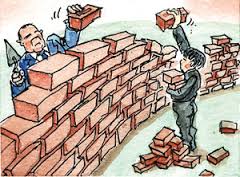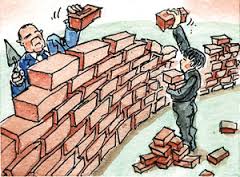
Tommy Koh, ambassador-at-large for Singapore's Ministry of Foreign Affairs, said that rising protectionism in the West has become a threat to Asia's prosperity.
"I worry about the rise of protectionism and economic nationalism in the U.S. and in Europe. I see this as a direct threat to the prosperity and prospects of Asia," Koh said at the Credit Suisse conference on megatrends, held in Singapore.
"Asia has been able to make enormous progress because of the liberal economic order that the U.S., U.K. and other countries created at the end of the Second World War. And this liberal world order seems to be in jeopardy."
During the U.S. presidential election last year, protectionist rhetoric was ramped up.
With much of the rhetoric aimed at China and Mexico, the then-candidate Donald Trump ran on a platform promoting "fair trade" practices that would prove better for the U.S.
Trump has continued to target U.S. trade partners, calling Canada's actions on dairy a "disgrace" on Thursday and launching a probe of cheap steel exports, including China even though he has since walked back some of the rhetoric – earlier this month he said he wouldn't label China a currency manipulator.
Sharing the conference stage with Singapore's Koh and defending the shift on trade was David Mulford, a former U.S. ambassador to India during the George W. Bush administration and a Treasury Department official during the Ronald Reagan administration.
"The U.S. position over all these years we've been talking about has been to promote and assist the rise of other nations. It is an extraordinary historic performance by a strong country," Mulford said. "In doing so, we have created all kinds of rivals and this has caused hitches and glitches and problems in the system, which now have to be addressed and it's appropriate that we address them."
Mulford did not specify what systemic problems he believed needed to be addressed. He is currently a visiting fellow at the Hoover Institution at Stanford University, which bills itself as non-partisan but is often viewed as conservative.
"There is no shortage of protectionism in Asia. Let's be frank about that. It is a major part of the Asian economic approach,” said Mulford as he also went on the attack against claims the U.S. had grown overly protectionist.
But Singapore's Koh was unconvinced.
"It is not fair for you to say there is protectionism everywhere, including Asia, so what's the big deal about the U.S. turning protectionist. The trend in Asia is in the other direction. We are opening up the economies, liberalizing, integrating with one another," he said. "The trend in America and Europe is a worry, because you are going in the other way. There is a significant difference between the dominant trend in Asia — which is towards opening up the economy, liberalizing, integrating — and the trend in the West."
In 2003, a free trade agreement was signed between Singapore and the U.S. But the Trans-Pacific Partnership, or TPP, a broad 12-nation trade deal, which the U.S. president claimed was a "disaster" that would hurt U.S. manufacturing, was the first treaty that Trump pulled the U.S. out of after he assumed office.
The Trump administration's stated preference for bilateral trade deals was defended by Mulford.
"Are there benefits to be derived by bilateral trade agreements versus ambitious global trade agreements," he asked. "I think smaller countries that are competitive, aggressive confident could do very well in bilateral trade negotiations and don't always have to be involved in a large package that makes it harder to negotiate a variety of different things rather than a one-on-one situation."
(Source:www.cnbc.com)
"I worry about the rise of protectionism and economic nationalism in the U.S. and in Europe. I see this as a direct threat to the prosperity and prospects of Asia," Koh said at the Credit Suisse conference on megatrends, held in Singapore.
"Asia has been able to make enormous progress because of the liberal economic order that the U.S., U.K. and other countries created at the end of the Second World War. And this liberal world order seems to be in jeopardy."
During the U.S. presidential election last year, protectionist rhetoric was ramped up.
With much of the rhetoric aimed at China and Mexico, the then-candidate Donald Trump ran on a platform promoting "fair trade" practices that would prove better for the U.S.
Trump has continued to target U.S. trade partners, calling Canada's actions on dairy a "disgrace" on Thursday and launching a probe of cheap steel exports, including China even though he has since walked back some of the rhetoric – earlier this month he said he wouldn't label China a currency manipulator.
Sharing the conference stage with Singapore's Koh and defending the shift on trade was David Mulford, a former U.S. ambassador to India during the George W. Bush administration and a Treasury Department official during the Ronald Reagan administration.
"The U.S. position over all these years we've been talking about has been to promote and assist the rise of other nations. It is an extraordinary historic performance by a strong country," Mulford said. "In doing so, we have created all kinds of rivals and this has caused hitches and glitches and problems in the system, which now have to be addressed and it's appropriate that we address them."
Mulford did not specify what systemic problems he believed needed to be addressed. He is currently a visiting fellow at the Hoover Institution at Stanford University, which bills itself as non-partisan but is often viewed as conservative.
"There is no shortage of protectionism in Asia. Let's be frank about that. It is a major part of the Asian economic approach,” said Mulford as he also went on the attack against claims the U.S. had grown overly protectionist.
But Singapore's Koh was unconvinced.
"It is not fair for you to say there is protectionism everywhere, including Asia, so what's the big deal about the U.S. turning protectionist. The trend in Asia is in the other direction. We are opening up the economies, liberalizing, integrating with one another," he said. "The trend in America and Europe is a worry, because you are going in the other way. There is a significant difference between the dominant trend in Asia — which is towards opening up the economy, liberalizing, integrating — and the trend in the West."
In 2003, a free trade agreement was signed between Singapore and the U.S. But the Trans-Pacific Partnership, or TPP, a broad 12-nation trade deal, which the U.S. president claimed was a "disaster" that would hurt U.S. manufacturing, was the first treaty that Trump pulled the U.S. out of after he assumed office.
The Trump administration's stated preference for bilateral trade deals was defended by Mulford.
"Are there benefits to be derived by bilateral trade agreements versus ambitious global trade agreements," he asked. "I think smaller countries that are competitive, aggressive confident could do very well in bilateral trade negotiations and don't always have to be involved in a large package that makes it harder to negotiate a variety of different things rather than a one-on-one situation."
(Source:www.cnbc.com)














